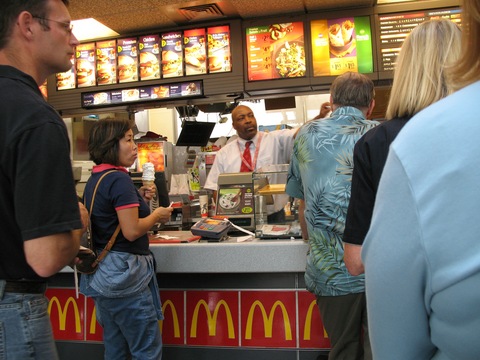McDonald’s, purveyors of cheeseburgers to billions, is most famous online today for their error in judgement on Twitter. They invited people to share their “McDstories” and were inundated with negative tweets. The #McDstories hashtag was actually intended for McDonald’s suppliers, who were supposed to weigh in with touching tales of the pride they take in the potatoes they grow (the only actual example I’ve seen) and stuff like that.
Instead, they got stories about fingernails in the food and attacks on the wholesomeness of their goods.
I’m not a McDonald’s customer myself, but I wasn’t surprised. If you Google “McDonald’s stories -Twitter” to filter out the current brouhaha, you’ll find things like “McDonald’s Horror Stories” and news reports of food poisoning at the top of the SERPs. I asked my college class if they had any McDonald’s stories. Many of them were drinking soda at their desks at 8:00 a.m., so we’re not talking about a bunch of health food devotees. They told me how McDonald’s food looks the same after three weeks in a car as on the day it was served, about the amount of petroleum products in the food, and — after checking the data on a smartphone — exactly how many grams of saturated fat you get in a Big Mac.
As I say, I wasn’t surprised. So how could McDonald’s have failed to foresee this? They pulled the campaign (yes, it was a promoted campaign, not a casual tweet on someone’s lunch break) after an hour and have replaced it with one asking people to list “little things” that make them happy. That’s going better, but they’re still a chapter in social media history.
We may be tempted to think that the message is this: If your company has been the subject of more than one tell-all expose or blistering documentary, don’t openly ask people for their opinions about you.
I think most of us could figure that out on our own. Instead, let me offer a few take-aways:
- Consider your company’s reputation when you plan your social media. You know what people say about you behind your back, right? If your company is small enough that nobody says anything behind your back, okay. Otherwise, think about possible backfire when you do your planning. I’m imagining the meeting where the #McDstories was dreamed up, and finding it hard to believe that nobody said, “Hey, do you think there might be some negative stories out there about McDonald’s?” Some level of self-awareness is needed.
- Phrase your questions carefully. We met with a car dealer client the other day and Rosie suggested asking customers if we could tweet pictures of their new cars. That’s manageable. “Little things that bring you joy” is manageable. Any random test of the phrase “McDonald’s stories” would have quickly shown that it was completely unmanageable.
- Have a contingency plan. McDonald’s did, and they were able to contain things pretty quickly. Those of us working in social media know all about it, but most of their customers probably missed it. Every company has experienced some negative social media interaction (read about ours) and it’s not the end of the world. As Rosie says, it shows that you’re interacting with real people and not setting up something fake. Just let forewarned be forearmed.
McDonald’s has almost 300,000 followers on Twitter and people who still eat there after Super Size Me won’t be turned away by an hour’s worth of snarky tweets. But they should certainly have seen it coming.


Leave a Reply